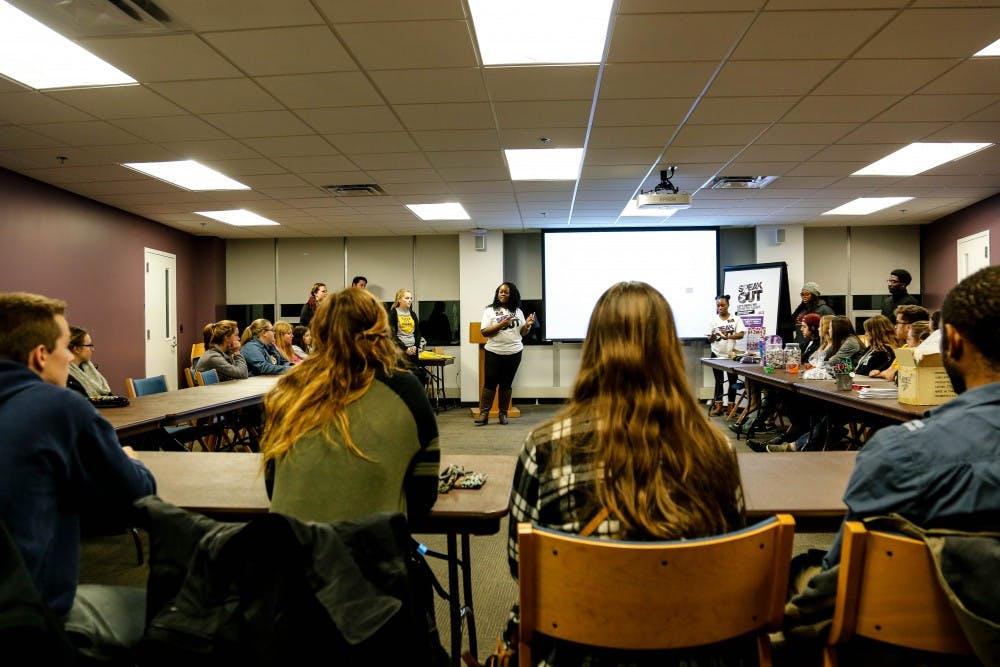Sexually transmitted illness tests no longer free

The World AIDS DAY host an educational session for CMU students about kits to pass out to students to help spread awareness about HIV/AIDS across campus, in UC Mackinaw Room, on Tuesday, Dec 1.
Students had the opportunity to receive free HIV testing the week of Nov. 29-Dec. 4, something that used to be available to them on campus every month at Central Michigan University.
The Central Michigan District Health Department and University Health Services used to collaborate to offer free monthly sexually transmitted infection testing clinics on campus, using grant funding from the Saginaw Chippewa Indian Tribe and the Mary Ellen Brandell Volunteer Center Safer Sex Patrol about two years ago, it lost grant funding and faced a decrease in staff, making the department unable to offer free testing, said Promotion Director Lorrie Youngs.
With funding from Safer Sex Patrol, a Mary Ellen Brandell Volunteer Center program, University Health Services offered a limited amount of free HIV testing to students for World AIDS Day. During any other week this year, self-referred HIV testing and counseling costs students $25 through the University Health Services Health Education office. Safer Sex Patrol has also provided funding for other free offerings of tests to students in the past.
To get extra funding, Isabella County has to demonstrate a need for the resources, Youngs said, however, proving a need exists poses several difficulties.
Need is determined by the number of people testing positive for STIs in the area. If people aren’t getting tested, there won’t be as many STIs reported. Students might not get tested because of cost, Youngs said. Meanwhile, the Health Department does not receive the funding that would make STI tests more affordable because not enough people have tested positive in the area. If there was an increase in the area, they might be more likely to get funding, she said.
“It’s kind of a double-edged sword,” Youngs said.
The Health Department applies for funding from the Tribe twice per year, but they haven't received the funding in about two years. Currently, the Health Department is working to get more funding for testing.
Testing for other STIs is available through Health Services, which has a full service lab, with the cost depending on the individual’s insurance, said Lori Wangberg, CMU Health Educator and HIV Counselor. STI testing is also available through the Central Michigan District Health Department on a sliding scale based on income.
Wangberg said testing can be costly for students, and could lead to some not being tested that should.
Wangberg said in addition to cost, some students might feel embarrassed or not know where to get tested.
Allen Park sophomore Madison Rodriguez said she didn’t know about the STI testing available on campus until she went to the health clinic for a checkup last year, making her believe more should be done to make students aware of the resources available. She also said it’s important for testing to be affordable.
“If I had to pay $25 for something, I don’t know if I’d be as likely to,” she said. “Definitely for a lot of people (cost) would be a setback, especially on a college campus.”
Additionally, few students are permanent residents of Mount Pleasant. This can affect the number of STIs reported in Isabella County. If a student claims their hometown address as their residence and tests positive for an STI, the case will affect their hometown’s numbers and will not be included in the data for Isabella County.
If someone comes in and states their partner tested positive for a sexually transmitted disease, the Health Department will treat them without testing them, so that will not be recorded in the data either.
The most common reportable STI is Chlamydia, with a rate of 235 cases reported in Isabella County in 2014. Wangberg recommends sexually active students to get tested annually for Chlamydia because they might not show symptoms.
Trojan released its annual Sexual Health Report Card in November, ranking CMU at 98 out of 140 schools based on sexual health resources available to students. Wangberg said she has never been contacted to provide information to Trojan, though she doesn’t know if other departments have been contacted.
“We take sexual health and safety very seriously because it is a matter of health for students,” she said. “We want people to be educated and safe and feel comfortable asking questions.”
The testing and counseling in the Health Education office includes assessing risk and educating students about sexual health and safety. Patients fill out a confidential risk history form about their behaviors and Wangberg talks about STIs, the testing and ways to be safer. She said it’s customized, educational and non-judgmental.
Not many people test positive for HIV on campus, she said, with Chlamydia and Gonorrhea being much more common among students.
Though students pay a fee for HIV testing and counseling, talking to Wangberg about health and wellness concerns is a free resource.
Since there’s a stigma associated with getting tested, she said, people sometimes search for information online instead of talking about their sexual health concerns with someone who’s knowledgeable. Wangberg said open conversation is very important.
“I want people to not sit here and have anxiety about the unknown,” she said. “It’s about getting tested, getting treated and being able to move on with life and learn something. We’re an educational institution and it’s really important (for students) to be educated on their health.”



